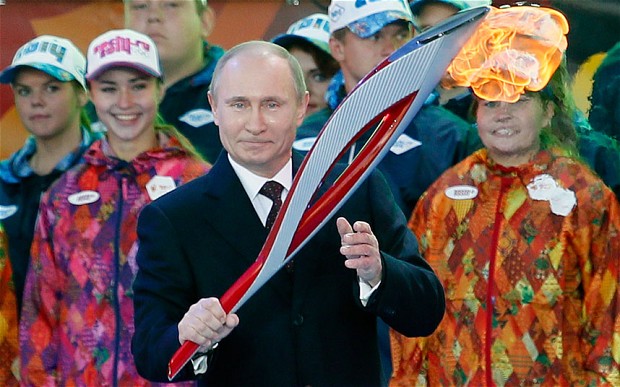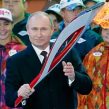
Putin’s Valdai Vision and Sochi Olympics Preparations Underscore Failure
Publication: Eurasia Daily Monitor Volume: 10 Issue: 184
By:

It is hardly surprising that the Russian opposition was not awarded the Nobel Peace prize this year. It remains in a state of disarray, and the veterans who enjoy international recognition, like Lyudmila Alekseyeva, have little in common with young angry rebels like Nadezhda Tolokonnikova—a member of the Pussy Riot punk rock band—who challenge the machine of police repressions from behind bars (https://echo.msk.ru/blog/troitskiy/1175070-echo/). What is truly surprising is that some Russian political commentators thought the Nobel committee might consider President Vladimir Putin a deserving candidate for the prize (https://ria.ru/world/20131011/969334557.html). The key argument behind this fanciful proposition is that Putin has, at the last possible moment, stopped the United States from launching missile strike on Syria and thus prevented a dangerous escalation of this conflict (https://slon.ru/world/nobel_za_mir_putin_mezhdu_strok-1003380.xhtml). The plain fact, however, is that the initiative (for which US State Secretary John Kerry and Russian Foreign Minister Sergei Lavrov indeed deserve credit) has by no means mitigated the civil war in Syria and is certain to hit severe obstacles to its implementation (see EDM, September 12, 19).
It is not the continuing Syrian tragedy or the progress in chemical disarmament that matters for Russian policy-makers and their propagandists but the imagined success in confronting the US and derailing the plan for a “regime change,” thus discrediting the doctrine of “humanitarian intervention.” This victory over Russia’s “principal adversary” has given such a boost to the anti-American rhetoric that for the first time since the war with Georgia in August 2008, Russian opinion polls show a prevalence of negative attitudes toward the US. Moreover, 71 percent of respondents believe that Washington puts pressure on Russia (https://www.levada.ru/10-10-2013/rossiyane-o-ssha). Putin both fans these prejudices and seeks to utilize them to give substance to his vision of a rejuvenated Russia that stands firm against Western decay and multiculturalism—a vision which he presented at the recent Valdai discussion forum (https://ej.ru/?a=note&id=23280). Putin sees benevolent paternalism and social justice as the building blocks of his imagined “civilization.” But this outlook clashes with the reality of Russia’s spectacular inequality and shameless corruption. So the country’s juxtaposition with an unfriendly and treacherous West becomes the defining feature of Putin’s pretentious design.
This visionary anti-Westernism translates into a series of offensive gestures, like the Zapad 2013 military exercises in Belarus, and provocative insults, like the ban on the import of dairy products from Lithuania (https://ej.ru/?a=note&id=23331; RBC Daily, October 8). The Netherlands were also on the receiving end of Russia’s ire as Putin demanded an official apology for a mistreatment of a Russian diplomat, who was allegedly restrained by police from assaulting his own children in a drunken rage (Kommersant-FM, October 8; https://echo.msk.ru/blog/apollinaris/1175440-echo/). A Dutch apology was duly issued and a “tulip” trade war was thus prevented. The incident fits into the pattern that European diplomacy has adopted of treating Russia with extra care—for instance, seeking to quietly resolve the problem with the Greenpeace activists who were charged with piracy after an action against Gazprom’s oil platform in the Pechora Sea (Nezavisimaya Gazeta, October 11). This caution cannot, however, prevent the serious political clash shaping up around the European Union’s Eastern Partnership summit in Vilnius, Lithuania, scheduled for late November.
The key point of this summit is supposed to be the signing of the EU-Ukraine association agreement, which would remove many trade barriers and promote significant reform in the sixth largest (by population) European country (not counting Russia). This long-prepared agreement does not affect any Russian economic interests—but it does undermine Putin’s vision of a Russia-centric “civilization” to which Ukraine allegedly belongs (https://polit.ru/article/2013/09/05/tk050813/). Every lever of heavy-handed persuasion and gentle blackmail has been put to work in order to shift Ukraine from the course of rapprochement with the EU—only to discover that not a single political force in Kyiv is ready to accept the Russian alternative (Nezavisimaya Gazeta, October 4). The Customs Union of Russia, Belarus and Kazakhstan, which Putin imagines as his great achievement and a part of his lasting heritage, makes little economic sense and serves more as a means of extracting concessions from Russia by its other members (Vedomosti, October 8). Alyaksandr Lukashenka, the authoritarian ruler of Belarus, is a master of the game of Euro-fantasy, not even hesitating to hold Russian CEOs in custody to make a political point. And now he is eager to play on Putin’s anxieties centered on Ukraine by demanding new preferences from Russia and even throwing in a deliberately provocative suggestion to take over the Kaliningrad exclave (https://newtimes.ru/articles/detail/72536).
Putin struggles to escape from his self-made trap of trying to reunite the dispersing fragments of the former Soviet Union. And he finds that his only useful tool for boosting “patriotic” feelings is to stage grand sports events. Last week, a nationalistic frenzy of unprecedented scale was built up in Moscow around the heavy-weight boxing match between Ukraine’s Vladimir Klitschko and Russia’s Alexander Povetkin, which came to an embarrassing anti-climax as the great Ukrainian champion won convincingly and conquered the crowd with his impeccable sportsmanship (Novaya Gazeta, October 8). The 2014 Winter Olympics in Sochi are surely supposed to provide the culmination for Putin’s sport-political campaign, and the tasteless show started last week with the symbolic arrival of the Olympic flame to Moscow. The ceremony was spoiled as several torches produced at the Krasnoyarsk missile plant malfunctioned so that the flame had to be re-ignited with a cigarette lighter (Vedomosti, October 10). The crudely politicized games have already set the record in exorbitant costs and invite protests from many different quarters, from human rights groups to ecologists, while the accumulated frustrations burst out in riots, like in the Moscow suburb of Biryulevo last Sunday (October 13) (https://newsru.com/russia/13oct2013/biruza.html).
The raw ugliness of that xenophobic pogrom destroys the pretty propaganda picture of a traditionalist country devoted to its irreplaceable leader and coming out to cheer the Olympic flame before creating the moment of national unity in Sochi. The country is, in fact, awakening to the urgency of Russia’s challenges that have grown in the conservatory of petro-prosperity—and becomes resentful about the inability of Russian leaders to connect with its problems. Putin’s sincere anti-Westernism adds to some of the building anxieties but cannot have any unifying effect as the urban middle classes are caught between the anger of the deeply illiberal “have-nots” and the manipulations of the corrupt pseudo-patriotic elites. The fragmentation of Russia’s disoriented society leaves Putin with the illusion of safety, as there are no identifiable political challengers to his rule; but Putin’s eroding legitimacy makes his Valdai vision of presiding over a “civilization” into a crude fraud.




